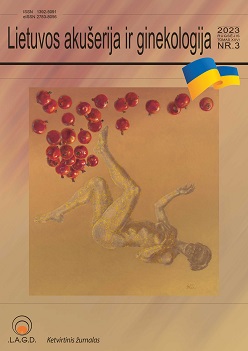THE OPINION OF WOMEN AGED 16–55 ON FREE OR PARTIALLY SUBSIDIZED MENSTRUAL HYGIENE PRODUCTS IN LITHUANIA AND ITS INFLUENTIAL FACTORS
Abstract
Aim. Assess the opinions of women aged 16–55 regarding free or partially subsidized menstrual hygiene (MH) products in Lithuania, along with the influencing factors, and analyze the potential prevalence of menstrual poverty. Methods. An original questionnaire comprising 38 questions was developed, with its validity assessed through an online pilot survey (n = 30), and subsequently refined based on expert feedback. The questionnaire was distributed via social media platforms, with the study period ranging from January 1st to January 31st, 2023. Results. The survey was completed by 642 respondents, and all filled-out questionnaires were suitable for analysis. 93.6 % of the surveyed women living in Lithuania expressed support for the initiative of free or partially subsidized MH products. Significantly higher levels of agreement were observed among women under the age of 25, who did not have children, and earned ≤ 1000 Euros per month. The majority of women did not experience financial difficulties in purchasing MH products, yet 57.9 % of the participants indicated that price influenced their choice of MH products (p = 0.001). Women who used disposable MH products were more in favor of compensation for these products, whereas those using reusable MH products were less in favor (p < 0.05). Women with regular menstrual cycles spent an average of about 9.7 euros per month on MH products. Those who earned > 1000 Euros per month (p = 0.025) and had higher education (p = 0.034) allocated higher expenses for MH products. Conclusions. Nine out of ten surveyed women would support free or partially subsidized MH products in Lithuania. Women’s opinions were influenced by age, monthly income, the nature of menstrual cycles, and the type of MH products used. The acquisition of MH products did not cause significant financial difficulties for the respondents, yet the price of MH products did affect their choice.

